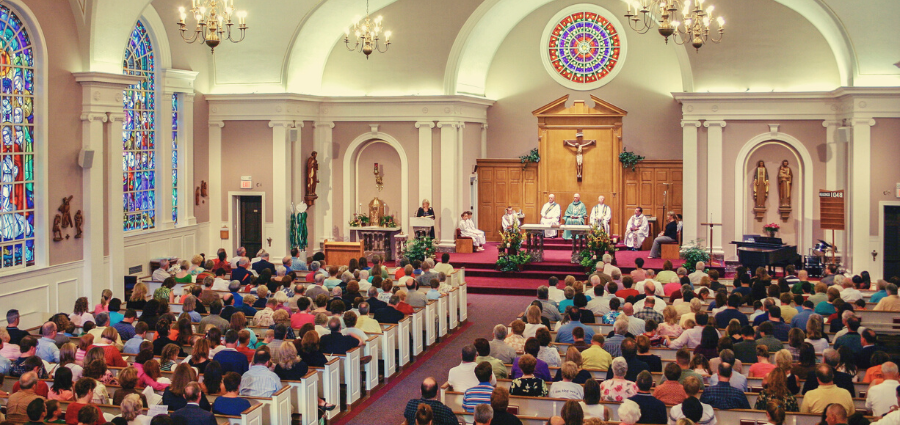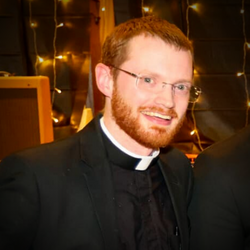
Why Come to Mass on Sunday?
Learn more about our faith | Return to the Church
These are three questions that many people ask with sincerity—they ask them honestly:
- Why can't I pray in nature, which truly lifts my spirit up to God?
- Why do I have to be with others if I pray better on my own?
- Why couldn't I substitute my personal prayer for Mass if I'm very busy?
I want to address these questions with gentleness and love because, as I said, I think many people ask them sincerely. And I'd like to begin with our Gospel passage which might be able to set us in the right direction. In the Gospel, Jesus passes through Samaria to get to Jerusalem. Samaria is in the central part of the Holy Land, and Jerusalem is in the South. It's in Jerusalem that Jesus will undergo his Passion once He arrives in the city.
As He's walking with His disciples, He encounters a group of ten individuals with leprosy. The ten of them must remain at a distance so as not to pass on the disease. They raise their voices, saying, "Jesus, Master! Have pity on us!" And He responds by saying, "Go show yourselves to the priests."
Interestingly, you would only go and show yourself to the Jewish priests if you were already healed. The priests would inspect you, confirm that you were indeed healed, welcome you back into society, and offer up a number of sacrifices for you. Notice that Jesus didn't touch them and heal them. He didn't say, "Be made clean." When He told them to go to the priests, it would have been like directing a hospital patient with a serious illness, "Go to the nurse's station. Tell them you are healed, and you would like to check yourself out of the hospital." The presumption is that they would be healed by the time they got to the priests. And they were!
So, what does this have to do with going to Mass on Sundays? After they had been healed, only one of them returned to give thanks, and only one returned to Jesus himself. Sunday Mass is when we return and give thanks to God Himself. And that's what Jesus desired in the Gospel; He desired, longed for, and expected them to return to Him. "Ten were cleansed, were they not? Where are the other nine?" I suppose there are other ways the other nine could have shown thanks, but it's clear that Jesus wanted them to return to Him in person.
The first question we raised was, why can't I go and spend time in nature on Sunday? Why can't I find God in the beauty of creation?
Wanting to spend time in God's creation is good, noble, and beautiful. God wants us to marvel at a majestic forest, the ocean's immensity, and the beauty of a sunset. But we can't replace the artwork for the Artist Himself. He created all of this world in all of its wonder as an act of love for us. But He desires not just our wonder; He desires us. When we come to Mass on Sunday, we find the Creator, the Artist; we find God Himself in the Eucharist.
Our second question: what if I feel I can pray better at home where there are fewer distractions?
Well, it's true—here at Sunday Mass, a lot is going on—people coming and going, you can hear that door in the back of the church every time it opens and closes, there are people who need to use the bathroom, children make noise, people drop their kneelers—welcome to our parish family. There's messiness within our parish family, just as there is within any family. Nevertheless, you belong to a family.
On the day of your Baptism, you were baptized into a real family. In our biological families, we share flesh and blood, the same DNA. We share a genuine natural bond. In Baptism, we share a supernatural bond, not based on DNA but rather grace. The definition of grace is God's life within your soul. All of us have bodies; you can see your body. And we also have souls, and grace is God's divine life within your soul. Grace is what we have in common as a family, and every Sunday, we gather as God's family.
Think about it this way: what would that mean if your mother or father were to have a birthday party? It would mean the rest of your family is going to go. Now, you might think, ugh, I'd rather not go. I'd rather not deal with my siblings, my in-laws, and humanity in general. But you would go for your father or your mother. Nobody would ever say, "Oh well, I'll be with you in spirit. I'll be thinking about you. No, you wouldn't do that to your mother or father because you belong to something greater than yourself. You belong to a family. The same is true for us as Catholics; we belong to a family. When we come back to Mass every week, we come together as His family, and we find Him here, truly present in the Eucharist.
Our third and last question: "Well, Father, I really just have a busy schedule and I speak to God all the time throughout the week. Isn't that enough? What would be so special about those four walls of the church?"
Well, before we answer that question, it may be helpful to make a distinction. Within our spiritual lives, we have two different types of prayer.
The first is personal, private, or devotional prayer. The second is liturgical prayer, meaning Mass and the other Sacraments. Now, personal prayer is vital, but there's something that happens here at Mass that we can't do on our own, driving to work, reading Scripture, and praying as a family. At Mass, the Sacrifice of Jesus on the Cross is made present. No matter how many times we pray the Rosary, no matter how intensely we pray, and no matter how many novenas we say, our personal prayer cannot do what the Mass does. The Mass is the re-presentation, not the representation, but the re-presentation of His Sacrifice on Good Friday. When we come to Mass on Sunday, we return to Jesus to give thanks and to be a part of the sacrifice which our personal prayer could never accomplish.
Today, we give thanks to God for the gift of the Mass. When we come to Mass on Sundays, we're returning to Jesus personally. We cannot substitute the artwork for the Artist, creation for the Creator, who is here personally in the Eucharist. We return to Jesus as a real family based on grace. And we return to Mass because it alone can make present His sacrifice. He waits, expects, and longs for our return to Him personally in the Eucharist.
About Father Matthew Gill
Father Matthew Gill is a priest in the Diocese of Fall River, MA. He is currently assigned as pastor of Holy Family parish in East Taunton. Father Matt also serves as chaplain to a Hispanic community and local Catholic school. During his free time, you can find him playing jazz and funk with priest friends in his band, Vatican III.

